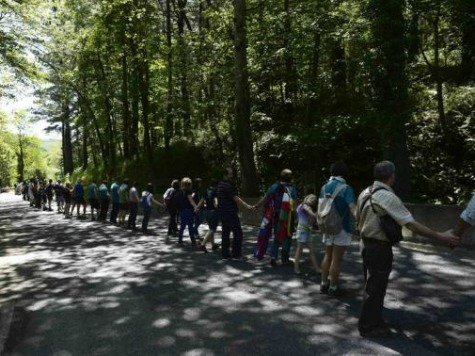The Basque separatist group Gure Esku Dago (“It Is in Our Hands”) organized a human chain that connected the northern city of Pamplona to Durango, Biscay. The controversial move has been condemned by Spanish authorities for the use of children as young as two.
The protest involved simply holding hands, as Basque activists united and waved flags in a chain that connected Durango to the city of Pamplona outside of the Basque Country. Some held up signs with slogans such as “Our Right” and “Our Decision” written in native Basque. While many seek full independence from Spain, the Basque separatist movement has also called for greater freedoms from taxes and in education and law enforcement.
The group is demanding a referendum on independence from Spain. In late May, the Basque Country declared its intentions to call for full independence by adopting a declaration of self-determination, described by Reuters as “a political statement which carries no legal weight.” The idea for the human chain protest was inspired by a similar such human chain in Catalonia, where the the Catalan population of Barcelona has long been demanding independence from Spain. Catalan President Artur Mas is planning a November 9th vote for independence, though Madrid has declared such a vote unconstitutional.
Critics have argued that the protests have been an unwieldy disturbance, and some participating in the human chain sought to block traffic in the process in Pamplona, which is part of Navarre and not the Basque Country. Reports have surfaced that protesters also used children strategically to prevent law enforcement from dividing the chain. National Police agents reported that, in attempts to keep traffic flowing in the affected cities, “police found that between every two adults protesters fit small children, some as young as two and three years old, with which police found it difficult to do their job.”
The organization of nonviolent protests in the name of Basque sovereignty is a fairly recent development after decades of domination by ETA, a Basque terrorist group that announced an end to violent conflict in 2011 but refused to fully cooperate with Spanish police in returning arms. The Spanish government continues to struggle to prevent Basque extremists from organizing violently, arresting a group of fifty Basque radicals in May whom law enforcement reports had intentions of reviving ETA. Spain also continues its attempt to arrest every member of ETA known to have been involved in terrorist activity. A key bomb-maker for the terrorist group was arrested in Madrid’s airport on Sunday.

COMMENTS
Please let us know if you're having issues with commenting.